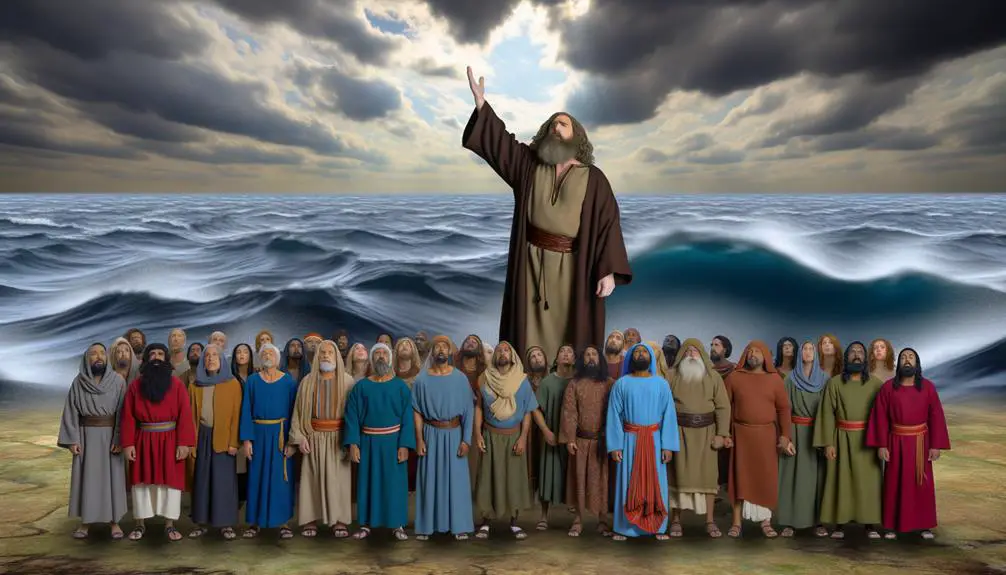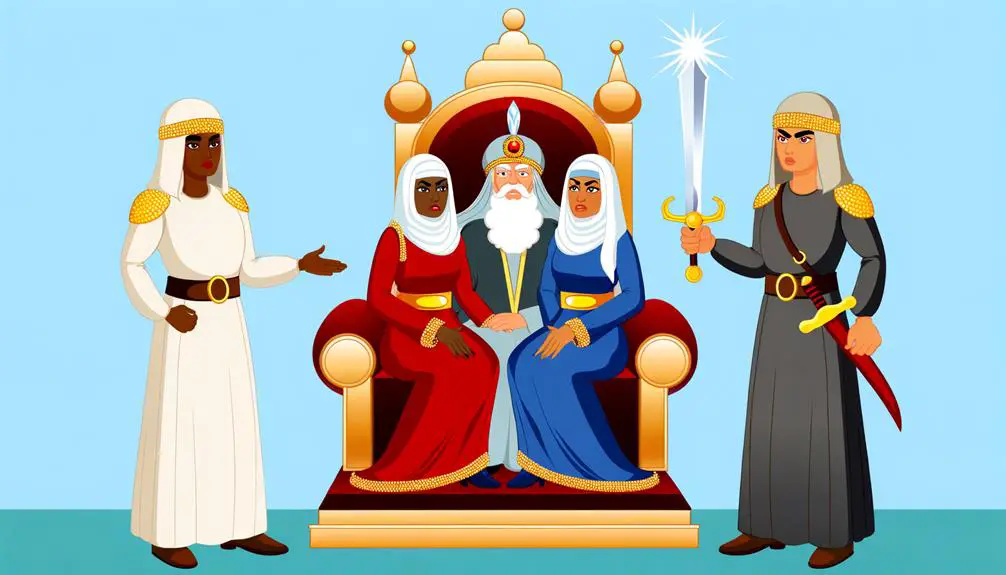Gain insights from biblical decision-making tales that echo timeless lessons on faith, morality, and leadership; discover how these stories can guide your choices.

Examples of Decision Making in the Bible
In the Bible, decision-making often reflects deep faith and moral dilemmas. Reflect on Adam and Eve's choice to eat the forbidden fruit, a decision that forever altered human history, highlighting moral responsibility. Noah, in building the ark, demonstrated obedience and meticulous planning, while Abraham's willingness to sacrifice Isaac underscored submission to divine will. Moses at the Red Sea showed leadership by trusting in divine guidance against all odds. By exploring these narratives, you'll appreciate the complexities involved. Each story invites reflection on how the lessons might resonate in your own experiences.
Key Takeaways
- Adam and Eve's decision to eat forbidden fruit teaches the consequence of moral choices.
- Noah's compliance with divine instruction to build an ark exemplifies obedient decision-making.
- Abraham's willingness to sacrifice his son highlights faith-driven decision-making under extreme tests.
- Joseph's choice to forgive his brothers demonstrates the healing power of forgiveness in decision-making.
- Moses' trust in God at the Red Sea shows leadership and faith in crisis decision-making.
Adam and Eve's Choice

In analyzing the pivotal decision made by Adam and Eve, it's evident that their choice fundamentally altered the course of human history. When you explore the narrative, you'll see that the act of consuming the forbidden fruit was not just a simple act of disobedience, but a profound exercise of free will. The Genesis account poignantly illustrates the free will implications inherent in their decision. This choice underscores a critical aspect of human nature: the capacity to make decisions that have moral weight and far-reaching consequences.
This narrative teaches you about moral responsibility, suggesting that with the freedom to choose comes the responsibility for the outcomes of those choices. Adam and Eve's decision to eat the fruit, despite divine prohibition, encapsulates the eternal conflict between divine command and personal desire. Their action set the stage for the concept of original sin, affecting the theological understanding of human nature.
As you reflect on this story, you're invited to mull over the profound implications of your own choices. Just as Adam and Eve's decision had lasting effects, so too do your decisions sculpt the narrative of your life and those around you. Through their story, the importance of thoughtful decision-making and the consequences of disregarding moral responsibilities are vividly illustrated.
Noah's Ark Construction
As you explore Noah's decision to build the ark, consider how his compliance with divine command showcases a profound act of faith and obedience. This scenario also presents significant challenges in resource management, as Noah was tasked with gathering and organizing vast quantities of materials and provisions. Each decision reflects a complex interplay between divine guidance and practical execution.
Divine Command Compliance
Responding to divine command, Noah undertook the construction of the Ark, a monumental task that exemplifies compliance with God's will in biblical narratives. You might wonder about the ethical dilemmas and authority questioning Noah faced. Imagine the pressure of adhering strictly to divine instructions amidst widespread skepticism.
Aspect |
Challenge |
Noah's Response |
|---|---|---|
Divine Command |
Direct instruction from God |
Obedient construction |
Ethical Dilemmas |
Justifying actions to others |
Faithful adherence |
Authority Questioning |
Doubts from community |
Resolute continuation |
Through this table, you can see how Noah's decisions underscore a deep commitment to faith and obedience, negotiating complex moral landscapes and community doubt with unwavering devotion. Such compliance serves as a profound example of faith in action, guiding your understanding of biblical decision-making.
Resource Management Challenges
Managing resources for the construction of Noah's Ark presented significant logistical challenges, posing meticulous planning and divine guidance. You'd have faced the challenging task of budget allocation, making sure that materials like gopher wood and pitch were available in sufficient quantities and at the necessary times. The sheer scale of the Ark, described in Genesis with specific dimensions, required precise measurement and resource control. Additionally, this scenario underscores early forms of crisis management, where you'd have had to anticipate and solve problems even before they arose, guided by prophetic insight. Such divine intervention not only facilitated the physical construction but also ensured Noah's compliance with God's commands, highlighting a symbiotic relationship between divine foresight and human obedience in biblical narratives.
Abraham's Sacrifice

In analyzing Abraham's sacrifice, one must consider the profound test of faith it represented, challenging him to prioritize divine command above all else. The narrative unfolds as a heart-wrenching moral dilemma, where Abraham's obedience to God conflicts with his deep parental love. You, as a parent, might imagine the immense struggle in Abraham's heart, deciding whether to obey God's command to sacrifice his son, Isaac, whom he loved dearly.
This decision highlights a critical aspect of biblical decision-making—unwavering faith and submission to God's will, often beyond human comprehension. It prompts you to ponder: would you have the fortitude to act as Abraham did? His decision was not merely a test of faith; it was a demonstration of trust in God's goodness and sovereignty, believing that God's plans, though mysterious, are always for the greater good.
Aspect |
Importance in Decision Making |
|---|---|
Obedience to Divine Command |
Central to Abraham's decision |
Parental Love |
Deep emotional conflict |
Faith in God's Plan |
Basis for ultimate trust |
Through Abraham's story, you're invited to reflect on the profound nature of faith and the complexities of adhering to it amidst life's most challenging decisions.
Joseph's Forgiveness
While Abraham's narrative challenges us with the extremity of obedience, Joseph's story shifts our focus to the power of forgiveness even in the face of betrayal. You'll find in Genesis, Joseph, betrayed by his own brothers, endures slavery and imprisonment before rising to power in Egypt. When he finally encounters his brothers again, instead of vengeance, Joseph chooses forgiveness. This decision isn't merely personal; it's transformative, facilitating emotional healing and relationship restoration.
Analyzing Joseph's choice, you see a profound illustration of forgiveness that doesn't ignore the wrongdoing but transcends it for a higher purpose. His forgiveness is an active decision to rebuild broken relationships, a cornerstone for sustainable reconciliation. It's here, in Joseph's heartfelt reunion and his tearful embrace, that the narrative vividly illustrates how forgiveness can recalibrate relationships marred by deep wounds.
Joseph's approach teaches you that forgiveness is not a sign of weakness but of strength. It's an essential step towards healing, not just for the individual but for all parties involved. By forgiving his brothers, Joseph not only secures his family's survival during famine but also re-establishes familial bonds, demonstrating that true forgiveness can indeed restore what was once lost or broken.
Moses at the Red Sea

Facing the Red Sea, Moses' decision to trust divine guidance exemplifies a pivotal moment of faith and leadership in biblical history. You find yourself at a crossroads similar to Moses, where leadership pressure mounts and the path forward seems insurmountable. Moses, standing before the vast waters, could have considered a strategic retreat; instead, he chose to stand firm, embodying a resolve that you, too, might aspire to emulate.
Under such dire circumstances, the decision to move forward rather than retreat required immense faith. Moses raised his staff, and the waters parted, illustrating that decisive action, underpinned by faith, can yield miraculous outcomes. This moment is not just about a physical escape but a spiritual passage from fear to faith.
Now, imagine the scene:
Element |
Description |
|---|---|
Waters |
Vast and threatening, symbolizing insurmountable challenges |
Staff |
A symbol of divine authority and the tangible means through which Moses acted |
Enemy |
The approaching Egyptian army, epitomizing imminent threats |
People |
Israelites, filled with fear yet following Moses' lead |
Pathway |
Newly formed in the sea, representing unexpected solutions in crisis |
As you reflect on Moses' example, consider how leadership involves not just guiding others but also maneuvering through crises with faith and courage.
Joshua and the Battle of Jericho
As you explore Joshua's decision-making during the Battle of Jericho, consider how his strategic choices were deeply intertwined with his unwavering faith in divine commands. His actions not only demonstrate a robust obedience but also highlight the profound consequences that followed. This narrative offers a compelling exploration of leadership under divine directive and the critical outcomes of faith-led decisions in biblical history.
Strategic Choices Executed
In the biblical account of Joshua and the Battle of Jericho, strategic decisions were vital to the Israelites' success. As you explore this narrative, you'll see how Joshua's leadership style and the ethical dilemmas he faced shaped their tactics.
- Reconnaissance: Joshua sent spies to gather vital intelligence on Jericho.
- Timing: The attack was meticulously timed, ensuring surprise and minimal resistance.
- Psychological Warfare: The use of trumpets and the ark created psychological pressure.
- Resource Management: Careful deployment of limited resources maximized their impact.
- Adherence to Command: Strict obedience to divine instructions underscored their operational strategy.
These elements collectively illustrate a complex tableau of ancient warfare, leadership acumen, and ethical navigation, framing Joshua's decisions as pivotal in the historical and theological context.
Faith in Divine Commands
Joshua's unwavering faith in divine commands profoundly influenced his leadership and the execution of strategies during the Battle of Jericho. Guided by divine intuition, he didn't merely follow orders blindly; rather, he engaged in a deeply spiritual process that required absolute trust in the unseen. This spiritual resilience is a cornerstone of his success, reflecting a profound commitment to his faith over conventional military tactics. You can see how his decisions, steeped in spiritual conviction, shaped not only the outcome of the battle but also the moral and ethical fabric of his followers. His reliance on divine guidance showcases a model of leadership that prioritizes spiritual integrity over pragmatic, often secular, calculations.
Consequences of Obedience
The consequences of Joshua's obedience during the Battle of Jericho reveal profound lessons on the interplay between divine command and human action. You observe through Joshua's experience that adherence to divine instructions yields significant outcomes. Here, the divine rewards and punitive repercussions are vividly illustrated:
- Divine Guidance: Joshua received clear commands from God, ensuring his actions aligned with divine will.
- Unquestioning Obedience: His strict compliance to these commands led to unexpected victory.
- Miraculous Victory: The walls of Jericho fell without conventional warfare, showcasing the power of divine intervention.
- Total Conquest: This obedience resulted in the complete capture of the city.
- Severe Consequences for Disobedience: Achan's violation of the ban illustrated the severe repercussions of not following God's commands.
Reflect on how these elements interact in your own decisions.
Esther's Courageous Approach
Esther's courageous approach to decision-making exemplifies how one's faith and wisdom can profoundly influence pivotal moments. Faced with a royal strategy and an identity crisis, she must decide whether to reveal her Jewish heritage to King Ahasuerus to save her people. This involves risking not only her position but also her life.
Let's visualize Esther's scenario through this table:
Stage |
Decision |
Outcome |
|---|---|---|
Discovery |
Learns of the decree |
Faces a moral dilemma |
Consultation |
Talks with Mordecai |
Gains resolve |
Preparation |
Fasts and prays |
Strengthens her spirit |
Action |
Approaches the king |
Risks her life |
Revelation |
Reveals her identity |
Saves her people |
In each of these stages, Esther's decisions reflect a deep interplay between divine guidance and human agency. Her actions are not impulsive but are considered and strategic, incorporating fasting, consultation, and careful timing. By stepping forward, she doesn't just resolve her identity crisis; she transforms it into a tool for deliverance. This teaches you the power of embracing your identity and using wisdom to navigate complex situations. Esther's story is not just historical; it's instructive, demonstrating how courage, anchored in faith, can lead to redemption and justice.
Solomon's Wise Judgment

Solomon's renowned judgment in the case of the two mothers vividly illustrates his divine wisdom and keen understanding of human nature. Faced with a heart-wrenching leadership dilemma, his decision-making process provides a brilliant example of judicial wisdom. Here's how you can see Solomon's acumen at work:
- Immediate Recognition of the Conflict: Solomon quickly understood the gravity of the situation, where two mothers claimed the same baby.
- Psychological Insight: His proposal to divide the baby revealed the true feelings of the mothers, distinguishing the genuine from the deceitful.
- Bold Decision: The king's shocking suggestion was a test, not an actual verdict, displaying his innovative approach to uncovering the truth.
- Protection of the Innocent: Solomon's primary concern was the welfare of the child, ensuring that his ruling safeguarded the baby's life.
- Restoration of Justice: By awarding the baby to the real mother, he restored peace and justice, reinforcing the importance of wise and fair leadership.
As you reflect on this narrative, consider how Solomon's approach might inspire modern leadership. His methods demonstrate that true wisdom often involves understanding deeper emotional currents and making decisions that protect and uphold the well-being of the vulnerable.
Frequently Asked Questions
How Do Modern Scholars Interpret These Biblical Decisions?
Modern scholars interpret these decisions by analyzing cultural contexts and applying narrative criticism, enhancing your understanding of historical and theological nuances. They seek deeper insights into the motives and outcomes, respecting the sacred texts' integrity.
What Psychological Theories Analyze Biblical Characters' Choices?
You're exploring how psychological theories like cognitive dissonance and moral development dissect choices. These theories offer a lens to understand the motivations and conflicts within decision-making processes, enhancing your scholarly and reverent analysis.
Are There Archaeological Evidences Supporting These Biblical Events?
You'll find that while some artifact authenticity and geographical correlations lend credence to biblical events, the archaeological evidence is often debated among scholars, impacting the certainty of these historical claims.
How Do Different Religions View These Decision-Making Stories?
In interfaith dialogues, theological perspectives on these narratives vary widely. You'll find that different religions interpret the underlying principles and moral lessons in distinct and often enlightening ways, enriching mutual understanding.
What Influence Do These Stories Have on Modern Law and Ethics?
You'll find that 80% of modern legal systems incorporate ethical frameworks influenced by ancient texts. These stories often serve as legal precedents, shaping contemporary law and ethics profoundly and enduringly.



Sign up